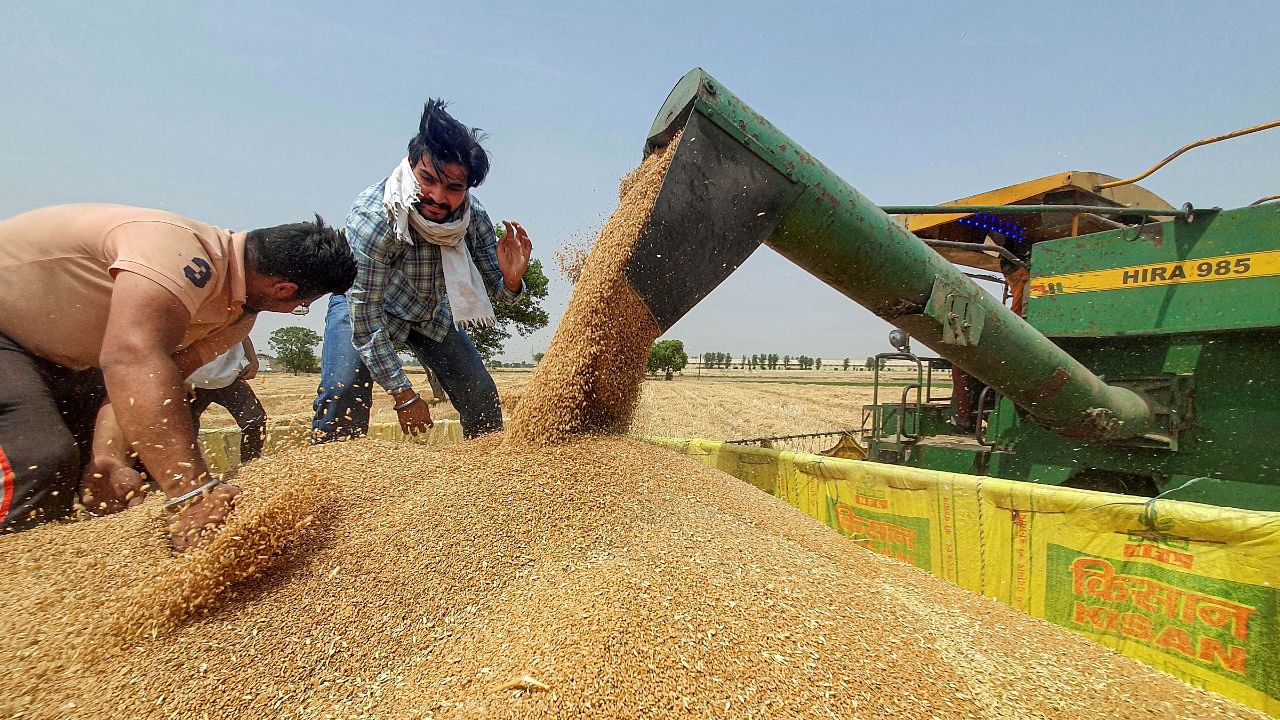
Amidst the Ukraine crisis, supplies of wheat from Russia and Ukraine have been disrupted, leading to a steep increase in its international price. In this backdrop, sitting on plenty of wheat stock, Prime Minister Narendra Modi has exhorted that India can help meet the global requirements, provided the World Trade Organisation (WTO) allows it. The caveat merits serious consideration.
India runs a mammoth programme of public stockholding (PSH) for food security purposes. Under it, agencies of the government like the Food Corporation of India (FCI) buy agri-produce such as wheat, rice/paddy, coarse cereals, from farmers at the minimum support price (MSP) and distribute at a heavily subsidised price of Rs 1/2/3 per kg through a network of fair price shops -- also known as the Public Distribution System (PDS) -- to meet the needs of India’s poor. The excess of MSP plus handling, storage and distribution cost over the realisation from sale is paid as subsidy from the Union Budget.
Initially, the system was intended to procure only the quantity needed to meet PDS needs plus a strategic buffer. But, thanks to vote-bank politics, now there is a total disconnect between the two. Instead, we have an open-ended procurement scheme whereby the government buys the highest possible quantities from the farmers at ever-increasing MSP. The scheme has come under the scanner of the WTO.
The subsidy given under PSH has two parts: (a) subsidy to the farmer being the excess of MSP of, say, rice over its international price, also known as External Reference Price (ERP) in WTO parlance; and (b) subsidy to the food consumer – being the excess of ERP over the price paid (say, Rs 3 per kg of rice).
The WTO is concerned with (a), branded as “product-specific” subsidies.
This -- plus subsidy on agri-inputs like fertilisers, seed, irrigation, power, etc., referred to as “non-product specific” subsidies -- gives what is termed as aggregate measurement support (AMS). Under the Agreement on Agriculture (AoA), AMS is capped at 10% of the value of agricultural production for a developing country. If a member-country gives AMS in excess of 10%, it is a violation.
The AoA came into force in 1995. For India, until 2005, MSP was less than ERP. Thereafter, MSP has been higher than ERP and, in the last decade, this gap widened. During 2018-19, in case of rice, for instance, AMS was at 11%, exceeding the 10% cap. Considering the hike in MSP and increase in quantities purchased thereafter, currently, the AMS would be even higher.
At present, India enjoys protection under a “peace clause”. Under it, “if a developing country gives AMS in excess of 10%, no member will challenge this until a permanent solution is found.”
However, the peace clause is not a panacea as it comes with several riders, such as submission of data on food procurement, stockholding, distribution, and subsidies. These also include establishing that subsidies are not “trade distorting.” This makes India vulnerable, which is evident from some countries insisting on ‘safeguards’ and ‘transparency’ obligations after it invoked the peace clause in 2018-19.
To get over these vulnerabilities, India is now asking WTO for ‘total exemption for support to PSH for food security’. The proposal was put up at the 12th MC during Nov. 30-Dec. 3, 2021; it has been deferred to the week of June 13, 2022. This pre-supposes that ‘all’ purchases from Indian farmers are used only for supplying to Indian consumers under the PDS; that no quantity from this pool ever reaches the international market.
In this backdrop, when India exports wheat from this stock – that is meant strictly for PSH for food security – this could be construed as a violation of WTO agreements. Merely that these exports will be at a price higher than MSP won’t help as under the AoA formula, AMS calculation is done using average ERP for the whole year, and that figure is bound to be lower.
That apart, compliance with the 10% cap has to be crop-specific as well as in the aggregate, which means that even if for wheat, the subsidy is less than 10%, India will found in violation of the WTO in case, for rice, it turns out to be higher, or product-specific and non-product-specific subsidies put together are higher than the threshold.
Thus, our claim for total exemption for support to PSH for food security will be seriously undermined the moment the government decides to export from this stock.
India will remain vulnerable as long as it continues with the extant policy of open-ended procurement. The only way it can circumvent WTO is to replace it by direct benefit transfer (DBT) of subsidy – be it to the consumers of food or to the farmers – as such transfers are not subject to the 10% cap.
(The writer is a policy analyst)
Check out latest DH videos here